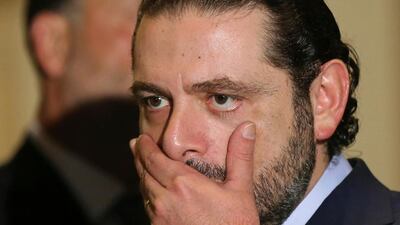The crisis in Lebanon is increasingly on the US radar in calls and meetings between state department officials and their Lebanese counterparts, and will feature in talks with Saudi minister for Arab Gulf affairs Thamer Al Sabhan on Friday.
Washington is monitoring the situation following prime minister Saad Hariri's televised resignation "very closely", a state department official told The National.
Sources in Beirut confirmed to The National that acting assistant secretary for Near East affairs David Satterfield has been making calls to key Lebanese politicians including advisers to Mr Hariri, who is currently in Riyadh. Additionally, charge d'affaires at the US Embassy in Saudi Arabia Christopher Henzel met Mr Hariri on Wednesday, a US official said, without releasing details of the meeting.
_______________
Read more:
With Hariri gone, Lebanon is on a dangerous path
Macron arrives in Riyadh to meet Saudi Crown Prince amid tensions with Iran
Saudi Arabia blasts 'Houthi terrorist' actions as UN warns of famine
_______________
Meanwhile, the US ambassador to Lebanon Elizabeth Richard met Maronite Patriarch Bechara Rai on Thursday ahead of his visit to Saudi Arabia. She also met the head of the Lebanese armed forces Joseph Aoun on Wednesday.
“The United States strongly supports the legitimate institutions of the Lebanese state,” a US official said as state department spokeswoman Heather Nauert confirmed that there would be no change to America's annual aid package to the Lebanese army.
The US movement on Lebanon precedes meetings at the state department between US officials and Mr Al Sabhan. A US official confirmed that the Saudi minister in charge of the Lebanon file will be holding meetings on Friday but did not say with whom Mr Al Sabhan would be holding talks. The US side also stressed that Mr Al Sabhan's “trip was planned before recent events".
On Twitter on Thursday, Mr Al Sabhan hinted at an escalation in measures related to Lebanon until the situation returned “to its normal course”.
Faysal Itani, a senior fellow with the Rafik Hariri Centre for the Middle East at the Atlantic Council, told The National that the US government is in a "tough spot over Lebanon". "The US position is to support the state institutions of Lebanon, while these are obviously compromised by Hizbollah's influence."
On the resignation itself, Mr Itani said that Mr Hariri's resignation "leaves a rump cabinet in place".
“Seeing as Mr Hariri has been a US ally, standing by his decision would reinforce the status quo, while opposing it would be akin to calling for him to rejoin the cabinet, which would be in Hizbollah’s interests,” he added.
Adding to the US dilemma, Mr Itani said, were the two emerging positions from the administration.
On the one hand, “US president Donald Trump has embraced a strongly anti-Iranian position that would lead him to support Saad Hariri’s resignation in order to isolate Hizbollah”, he said. On the other, “this would clash with traditional US policy of supporting the central government in Beirut”.


